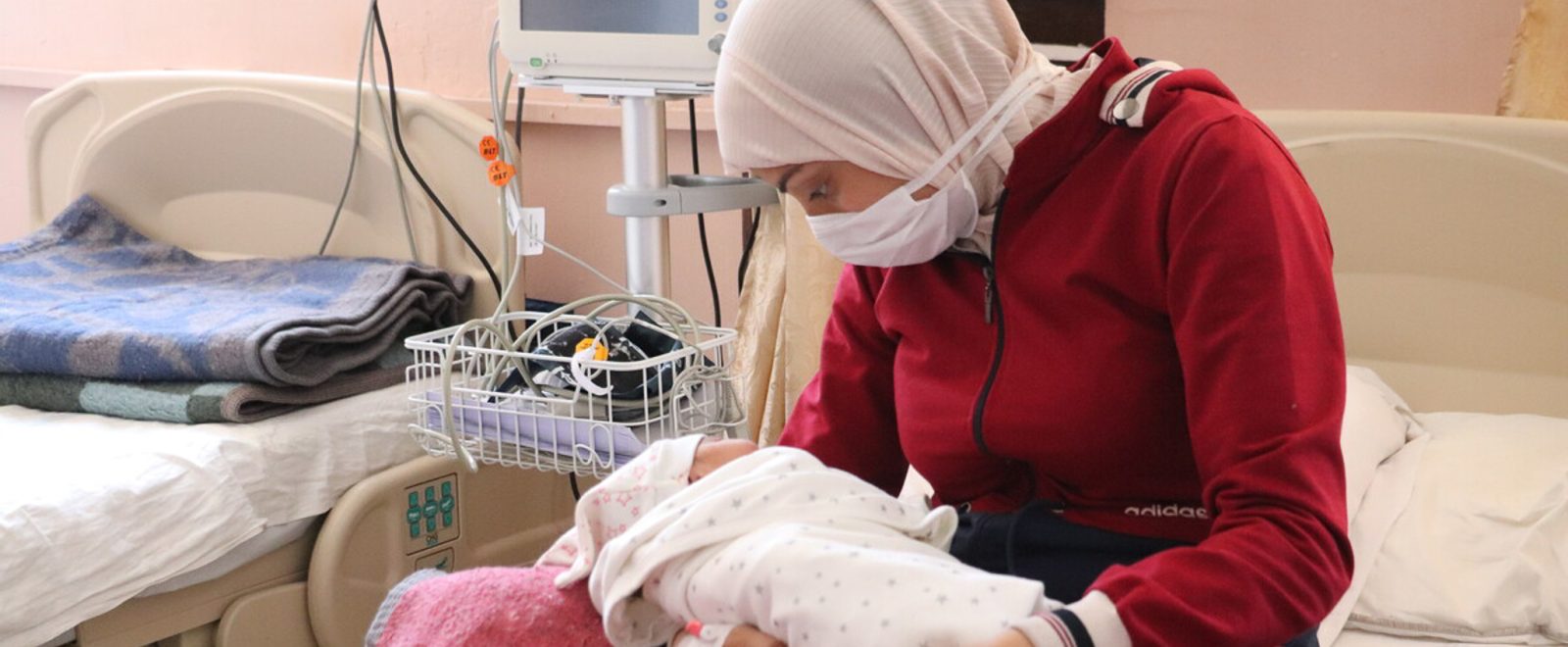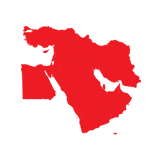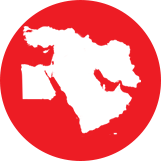IDLIB, Syria – As Syria marks six months on from an earthquake that claimed the lives of over 8,000 people, 2.3 million women, and girls have been left without access to medical care, particularly sexual and reproductive healthcare. With hospitals and clinics destroyed by the quake and attacks on healthcare facilities common, pregnancy, childbirth, and caring for infants have become perilous and challenging for women who have already borne the brunt of 12 years of conflict.
Alam Janbein, ActionAid’s Syria-Türkiye Humanitarian Response Lead, said:
“Giving birth should be a happy, joyous occasion for any mother, but instead, for women in north-west Syria, it has become a dangerous assault course of obstacles. All women have the right to carry a child and give birth in a safe, caring environment. However, as we see too often, in emergencies, it is women’s needs that are first to be deprioritized.”
4.6 million people are trapped by conflict in northwest Syria. Eighty percent are women and children who live in overcrowded conditions, in temporary displacement camps, in the province of Idlib. For women living in camps, traveling, even for urgent medical care such as cesarean sections, premature labor, or children needing emergency assistance, has become almost unviable. Long distances, shelling, lack of transport and money, and damaged infrastructure are just some of the obstacles they face.
ActionAid is supporting a local Syrian organization, Violet, to run one of two hospitals in Idlib.
Hospital Coordinator Dr. Waseem Bakir says:
“There is a huge gap in healthcare here that we must address. Approximately 85,000 people in this region alone rely on our care. Long distances and the rapid increase in the numbers of displaced people living in nearby camps makes our hospital a vital necessity.
The biggest challenge facing medical facilities, however, particularly in northern Syria, is the scarcity of medical staff, especially gynecologists. Pregnant women here have been without care for almost a year.”
Dr. Waseem and his staff are providing services to families living in 58 neighboring IDP camps, most of whom are women and children.
At the hospital, medical staff, from doctors to midwives to nurses, have been working against all odds and around the clock to deliver care to pregnant women, newborn children, and infants.
Ghufran, a midwife working at the newly funded maternity ward, who was delivering babies when the earthquake hit, says their services are essential:
“After the earthquake occurred, many women came to us, frightened and terrified.
The earthquake caused some women to miscarry, and we witnessed premature bleeding for many in their first and second trimesters. Some experienced high blood pressure. It was horrifying for these mothers.
WAlam Janbein, ActionAid’s Syria-Türkiye Humanitarian Response Lead, said
We also carry out important postpartum checks on new mothers and their babies.”
Life in displacement camps across Syria is harsh, especially amid record temperatures and a grinding economic crisis as the war continues. With the spiraling cost of living crisis, rates of child marriage are increasing in communities across the region – which Khadija, an assistant surgeon at the hospital, says is very dangerous for teenage girls:
“One of the biggest dangers we have encountered during this period of civil unrest is child marriage.
Child marriage causes many health problems for girls. They become pregnant before their bodies are ready, at 15 or 16 years old, which can result in premature births. Premature babies here cannot survive in the conditions they are born into.”
In the aftermath of the earthquake, the cost of everyday essentials jumped up by 40%, putting additional strain on families already on the breadline. In many contexts across the world, child marriage can be a negative coping mechanism to relieve economic hardshipi. With parts of the Middle East facing the highest levels of food inflation in the world, teenage girls are at even greater risk.
Janbein said:
“Pregnancy, childbirth, and childcare do not stop in a crisis. As we focus on recovery in Syria, services for women and children must be front and center of the international response, and their protection should be prioritized. Though the earthquake only lasted a few minutes, the toll on women and girls could well last a lifetime.”
ENDS
For media requests, please email Jenna.Farineau@actionaid.org or call 202 731 9593.
ActionAid’s humanitarian response in Syria over the last 6 months:
By funding Syrian-led organizations, ActionAid’s response has been community-led and highly effective, reaching 104,778 people through search and rescue operations, food, shelter, mental health support, and safe spaces for women. This includes partners like Freedom Jasmine and Action for Humanity in opposition and regime-held areas.
The role of young people as first responders has been critical in saving lives and supporting recovery. In the aftermath of the earthquakes, youth volunteers worked tirelessly with our partner Violet to pull survivors from the rubble and reached a staggering 6,330 people through search and rescue operations and emergency medical and mental health care.
At a newly operational hospital, funded by ActionAid and run by our partner Violet, more than 5,000 (5,275) women and girls displaced by the earthquakes have already received urgent medical care from a dedicated team of nurses, midwives, and doctors.
The hospital, one of just two hospitals in the Idlib province, provides many medical services, focusing on women and children, including reproductive health, vaginal childbirth, and cesarean section, as well as all services related to children and motherhood. In total, it serves a catchment area of 85,000 people. It has many departments, including operating rooms, an ambulance department, an incubator department, a medical analysis laboratory, a pharmacy, outpatient clinics, and an intensive care department. There is also a recovery department and a ward for post-operative patients.
In the reproductive health and obstetric wings, there are six rotating midwives. The cesarean section room includes a female gynecologist, assistant surgeon, operating technician, general surgeon, and anesthesia technician under each shift. The hospital includes 18 nurses in the pediatric and gynecological wards and has three gynecologists, three anesthesia technicians, three operations technicians, and three general surgeons.
Clean water and sanitation are essential to our everyday lives. Over the past 6 months, we have provided clean water, hygiene kits, and washing facilities to over 30,000 people through our partner Action for Humanity. In 15 temporary camps, we have ensured that women and girls have private facilities, which they can use without risk of harassment or assault.
Supported by a team of dedicated youth volunteers, our youth-led partner Violet provided a lifeline to hundreds of traumatized children living in remote areas through Mobile Mental Health units.
Notes to editor
ActionAid has new personal stories, photos, and high-resolution footage of healthcare workers and women who are accessing care at the hospital.
The following spokespeople are available for interview on request:
Dr. Waseem Bakir, Medical Field Coordinator at Violet. Dr. Waseem works with ActionAid’s local partner organization in Syria, Violet, as its Health Coordinator. When the earthquake struck, Dr. Waseem and his colleagues rushed to provide urgent medical care to people who were injured or displaced. They set up mobile clinics and offered support to medical centers in areas that were most affected by the earthquakes.
Fuad Sayed Issa is the founder of Violet. In 2011, at sixteen years of age, Fuad set up the charity.
Leading from the front, Violet has been supporting the earthquake response since day one, with the team sadly losing several colleagues in the rubble. Fuad, too, faced his own personal tragedy in February when he lost his son to the earthquake. Recently, through ActionAid funding, Violet has opened a maternal ward in Idlib. One of just two hospitals in the whole region, the ward is serving over 85,000 community members and internally displaced people. Fuad speaks English and Arabic.
Hisham Dirani is the CEO of Violet, an ActionAid partner that has been providing humanitarian assistance since the start of the conflict. Hisham speaks English and Arabic
Alam Janbein is the Syria-Türkiye Senior Humanitarian Response and Resilience Manager of the ActionAid Arab Region. Alam speaks Arabic, English, and French.


